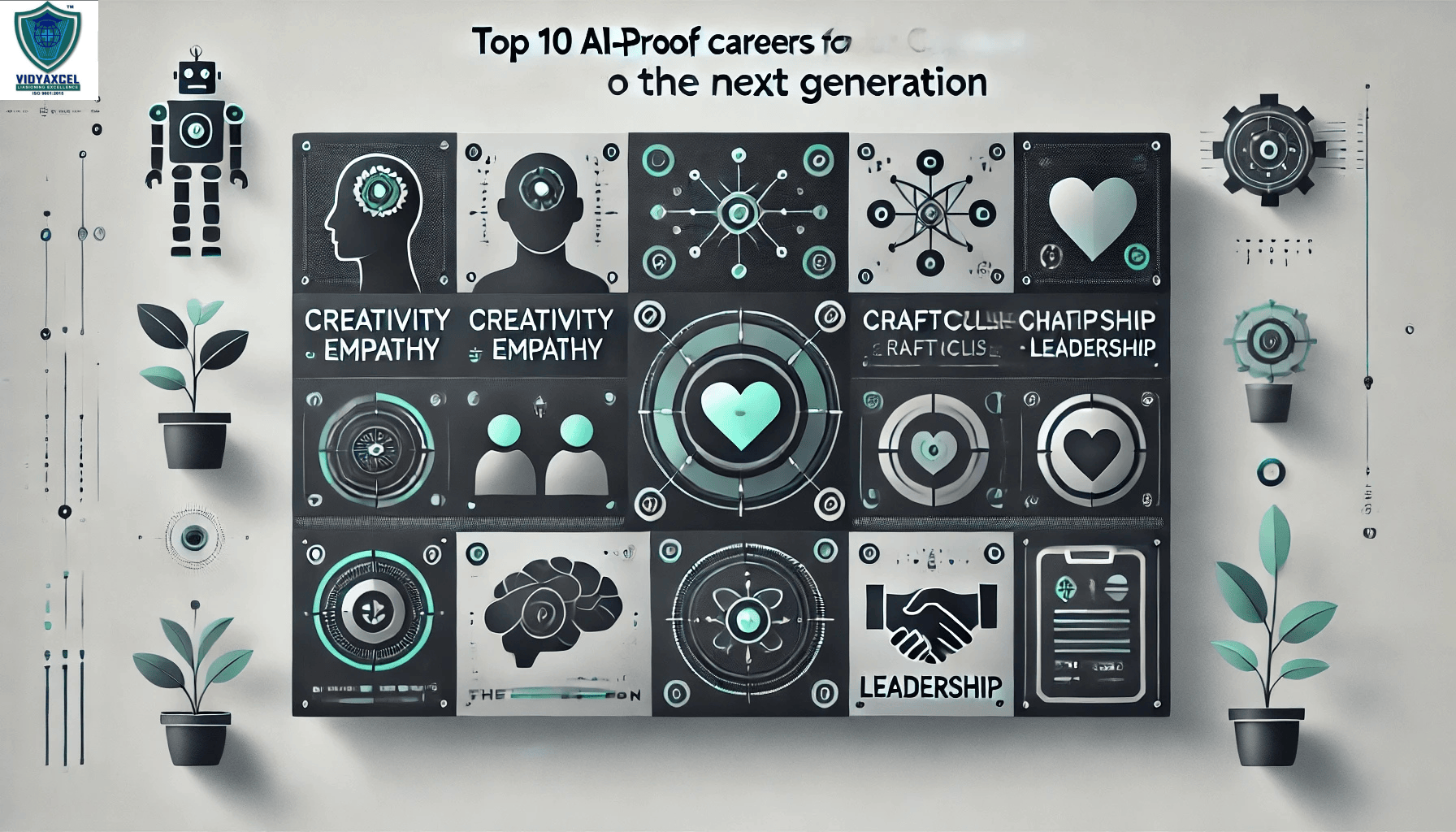Blog Details

25Apr
Top 10 AI-Proof Careers for the Next Generation
As artificial intelligence rapidly reshapes industries and automates tasks once thought to be uniquely human, the career landscape for the next generation is changing fast. While some roles are becoming obsolete, others are rising in value — especially those that rely on creativity, empathy, complex decision-making, and human connection. For parents, educators, and young adults planning for the future, it's crucial to focus on careers that are not only in demand but also resilient in the face of automation. Here’s a look at the Top 10 AI-Proof Careers that are expected to thrive in the coming decades — roles where humans will always have the upper hand.
1. Mental Health Professionals (Psychologists, Therapists, Counsellors)
- AI can simulate empathy, but real human connection is irreplaceable.
- Mental health is becoming a top priority globally — high growth expected.
2. Social Workers & Human Services Roles
- These roles involve deeply personal, emotional, and ethical decision-making that AI can’t replicate.
- Great for those passionate about helping others.
3. Creative Professionals (Writers, Designers, Filmmakers, Artists)
- AI can assist creativity but can't originate soul-filled stories, art, or emotion-driven work like humans.
- Originality, storytelling, and emotional intelligence remain human strengths.
4. Educators & Learning Designers
- The future of education will be hybrid (AI + human), but the human side of teaching, mentoring, and motivating can’t be automated.
- Especially strong demand for those specializing in early childhood, special education, or personalized learning.
5. Entrepreneurs & Business Innovators
- AI can optimize, but it can’t dream or disrupt like human entrepreneurs.
- The next-gen creators of products, services, and companies will drive the economy.
6. Healthcare Providers (Doctors, Nurses, Surgeons, Occupational Therapists)
- While AI helps diagnose and assist, human interaction, empathy, and trust in healthcare remain essential.
- Hands-on care and ethical judgment can’t be automated.
7. Scientific Researchers (Biotech, Environment, Physics, etc.)
- AI helps analyze data, but scientific breakthroughs still require human curiosity, intuition, and experimentation.
- Crucial in solving climate, health, and global issues.
8. Sustainability & Environmental Specialists
- Climate change response requires local solutions, policy-making, human behaviour shifts, and community engagement.
- Careers in green energy, conservation, and sustainability strategy are booming.
9. Cybersecurity Experts & Ethical Hackers
- As AI grows, so does digital risk. These roles are critical for protecting data, privacy, and global systems.
- Constantly evolving field with high job security.
10. Human-Cantered Tech Roles (UX Designers, AI Ethicists, Product Managers)
- These jobs blend tech + empathy to design AI/tech that works for people, not just processes.
- Demand is growing for tech professionals who understand humans.
Conclusion
In a world where algorithms can analyse data and robots can assemble machines, the careers that will stand the test of time are those rooted in what makes us human. Empathy, creativity, critical thinking, ethics, and personal connection can't be downloaded or replaced. As you guide yourself or your child toward a future career path, remember: the best opportunities lie not in outpacing AI, but in complementing it. Choose a path that evolves with technology — but remains deeply human at its core.
FAQ’s
1. What makes a career "AI-proof"?
An AI-proof career is one that relies heavily on skills machines can’t easily replicate — such as emotional intelligence, creativity, critical thinking, interpersonal communication, and ethical decision-making. These careers often involve human interaction, empathy, hands-on tasks, or innovation that AI can't fully automate.
2. Are AI-proof careers also high-paying?
Many of them can be. Roles in healthcare, tech ethics, cybersecurity, and scientific research often offer strong salaries. However, some (like social work or teaching) may offer more in terms of impact and fulfilment than financial gain — it depends on the path and specialization.
3. Can AI eventually replace jobs in these fields?
While AI might assist or transform how tasks are done in these careers, full replacement is unlikely. For example, AI can support a therapist with tools and data, but it can’t replace the human empathy, trust, and intuition that therapy requires.
4. How can students prepare for AI-proof careers?
Focus on developing soft skills like communication, creativity, leadership, and adaptability. Participating in internships, volunteering, hands-on projects, and interdisciplinary studies can also help build a strong foundation.
5. What role will AI play in these “safe” careers?
In many cases, AI will be a partner, not a competitor. It can help doctors make better diagnoses, assist teachers in customizing lessons, or support designers in generating ideas. The key is learning how to work with AI, not against it.
Our Office: West Bengal, Maharashtra & Delhi.
For More Infomation about admission in Medical, Engineering, Management & Study in Overseas Details.
View Current Study Overseas, Medical, Engineering & Management Admission Details Video.





